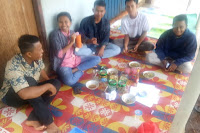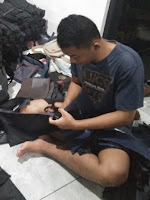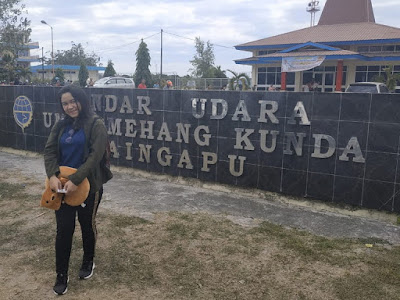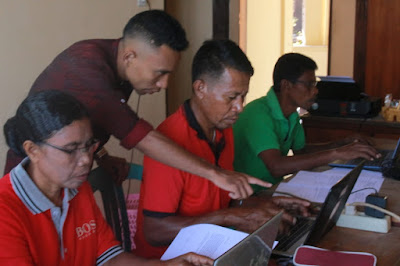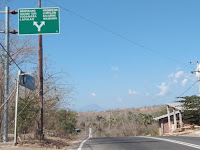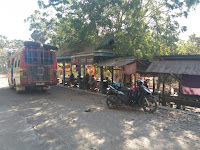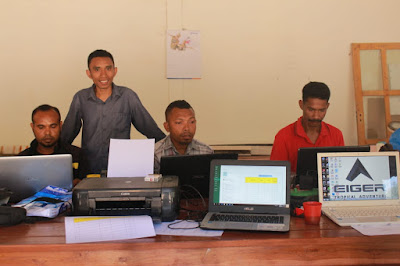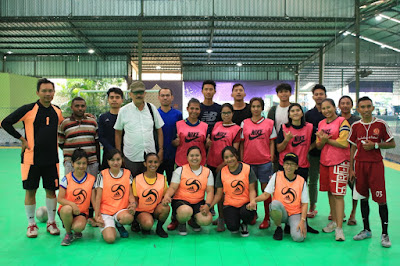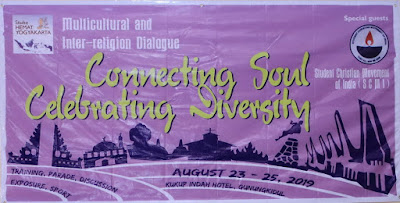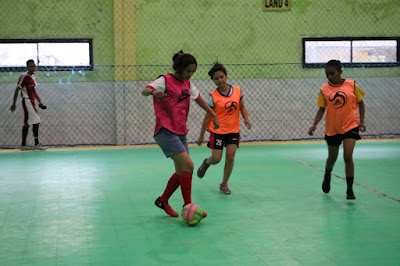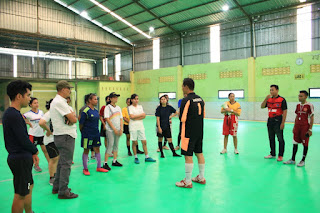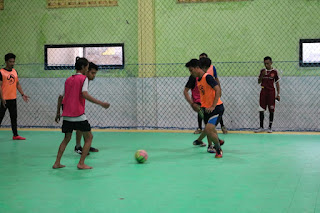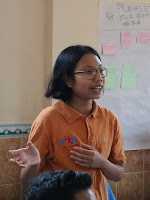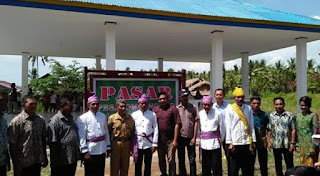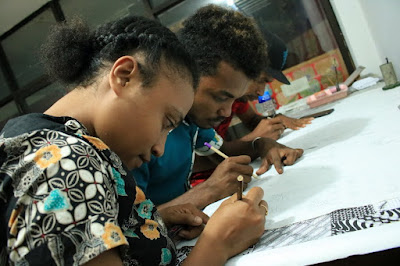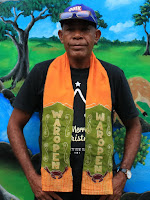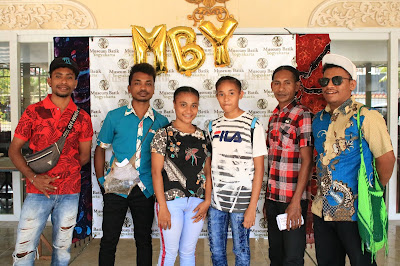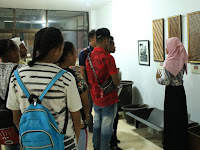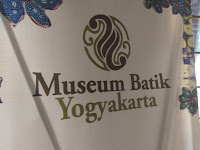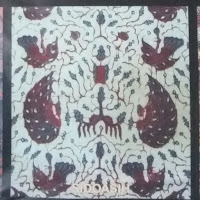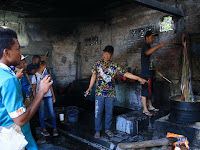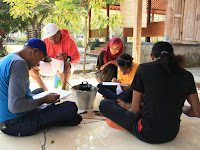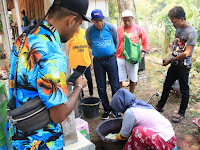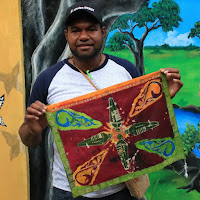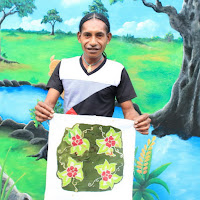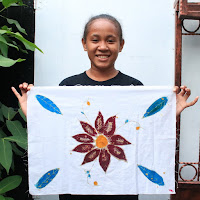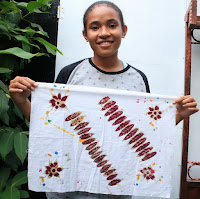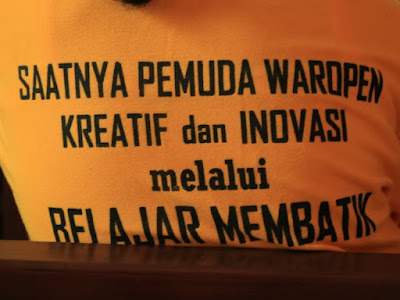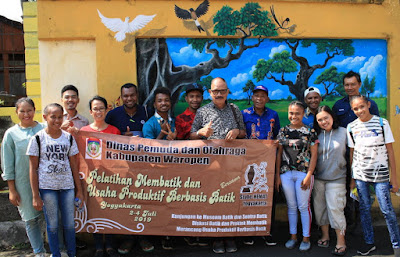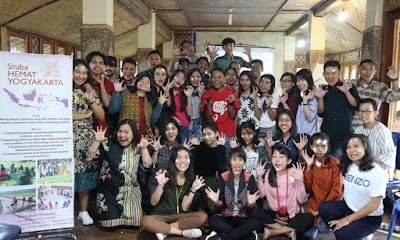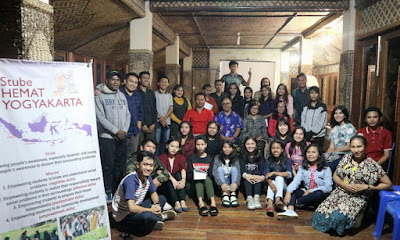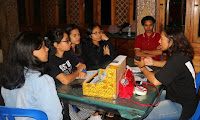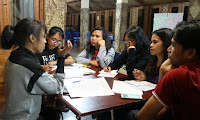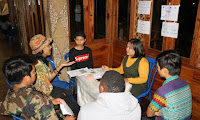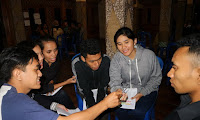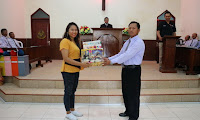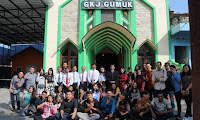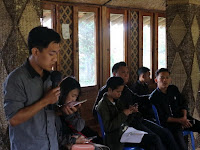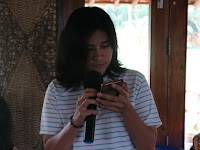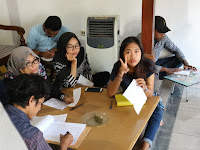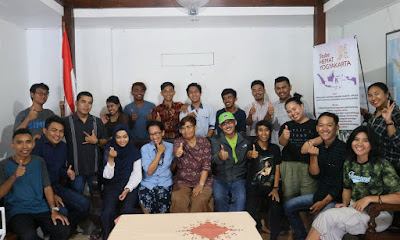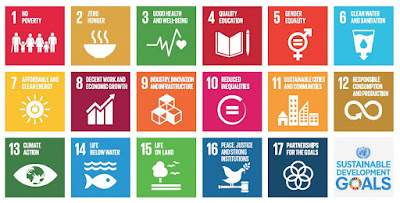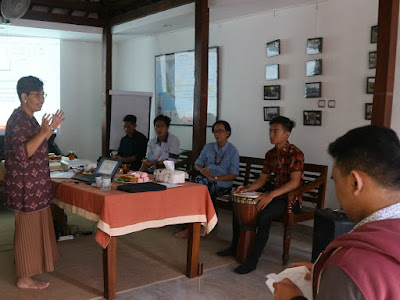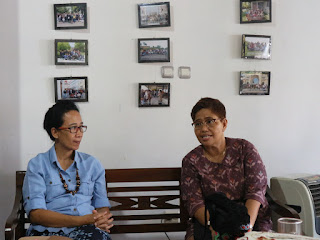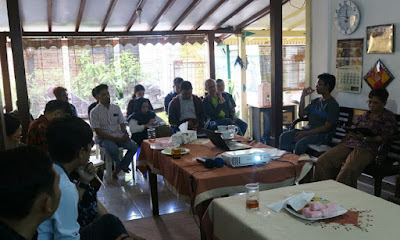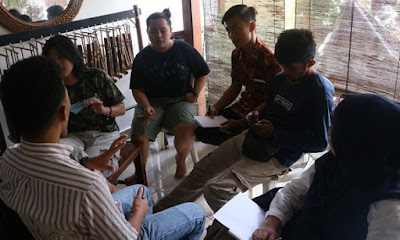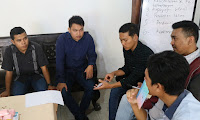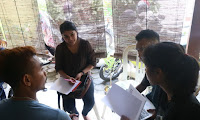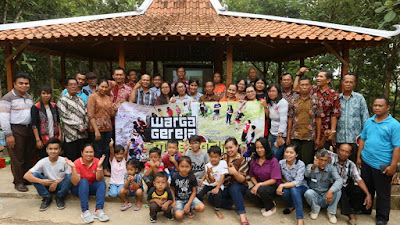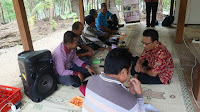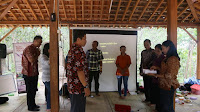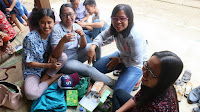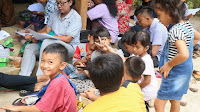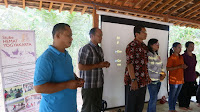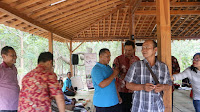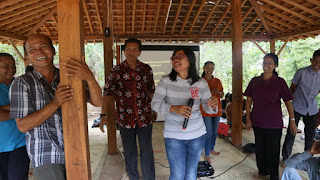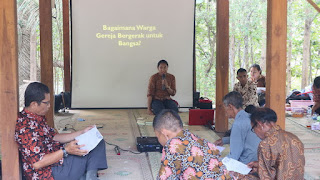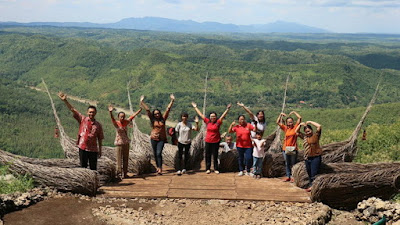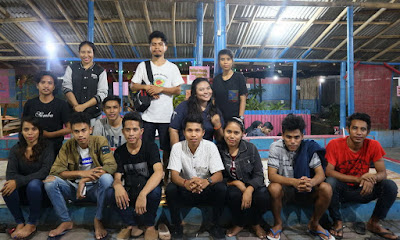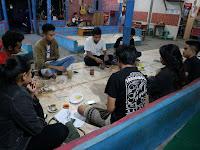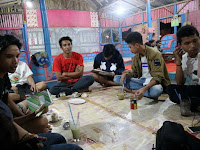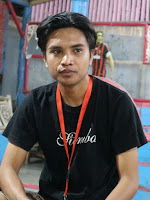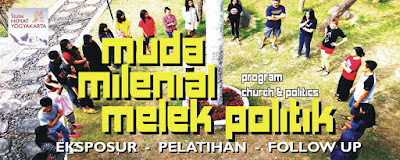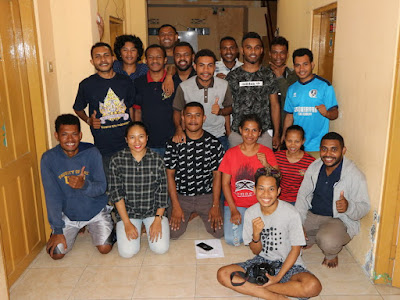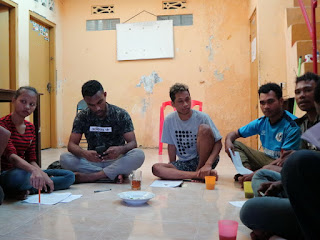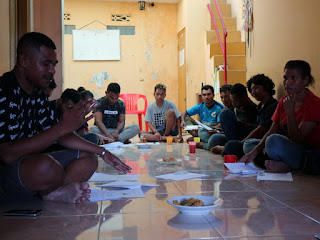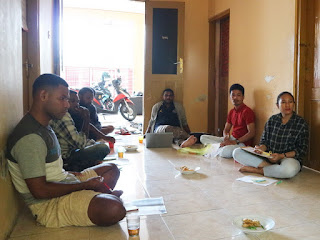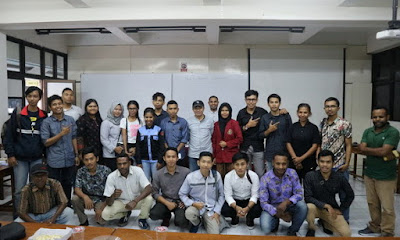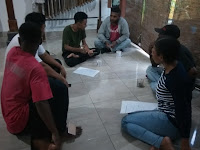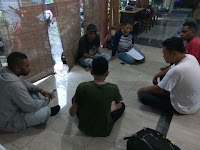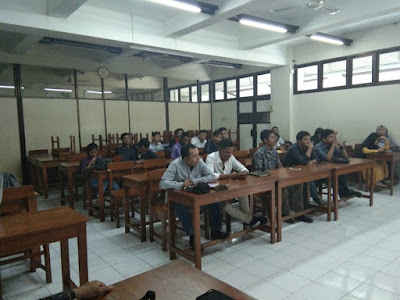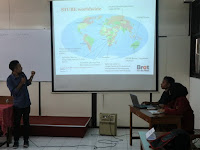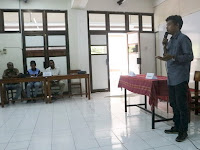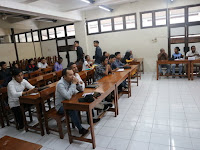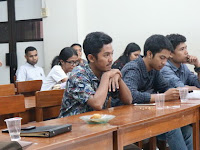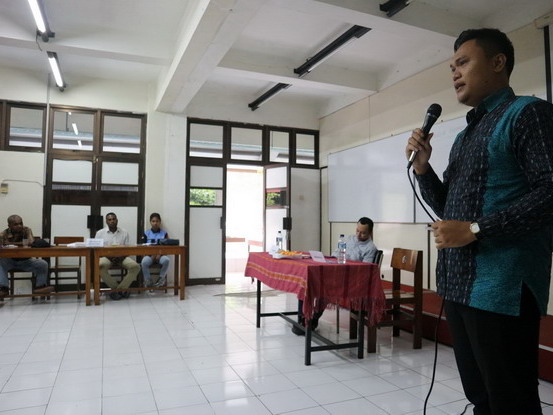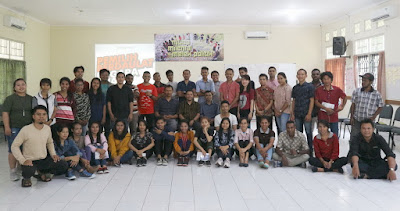Finding Local Context and Its Youth Four Students in Local Exposure Program
Tuesday, 31 December 2019by adminstube
 The important thing that is often be neglected is growing a 'sense of belonging' to the region of young students who go to study outside their islands. This sense of belonging will raise concern and desire to do something for the region of origin, because these young students are regional assets. The study opportunities outside are valuable blessing because not every young person from the area can continue study due to economic limitations, geographical conditions and cultural influences. Managing regional assets with focus on human resources (HR) has become a concern for Stube-HEMAT Yogyakarta as human resource development institution, especially students, by giving added value with knowledge, skills and attitudes to student activists in Yogyakarta so that awareness as agents of change for their home regions grows through Local Exposure program. The last Local Exposure program was followed by four students.
The important thing that is often be neglected is growing a 'sense of belonging' to the region of young students who go to study outside their islands. This sense of belonging will raise concern and desire to do something for the region of origin, because these young students are regional assets. The study opportunities outside are valuable blessing because not every young person from the area can continue study due to economic limitations, geographical conditions and cultural influences. Managing regional assets with focus on human resources (HR) has become a concern for Stube-HEMAT Yogyakarta as human resource development institution, especially students, by giving added value with knowledge, skills and attitudes to student activists in Yogyakarta so that awareness as agents of change for their home regions grows through Local Exposure program. The last Local Exposure program was followed by four students.
 Putri Nirmala Valentina Laoli, a student from Nias who studies governance studies at STPMD APMD Yogyakarta. Putri was eager to come back to Nias during her campus break to observe the traditional local weaving of Nias in Gido, her hometown. It began difficult to find such woven craft because the craft-women were mostly elderly, and young people were less interested in pursuing this skills even though actually this woven, such as bolanafo and tufo, was needed in Nias traditional events and Nias special souvenir. Putri went around the villages of Somi, Gido, and Hiliganoita, Bawolato, to find woven- crafts women, and when she met, they were very old and no one had inherited this skill. Plants used as woven fibers are Keleömö (Eleocharis dulcis), it is a type of grass that grows in swamps. The plants then are dried and flattened, then given colors and finally woven.
Putri Nirmala Valentina Laoli, a student from Nias who studies governance studies at STPMD APMD Yogyakarta. Putri was eager to come back to Nias during her campus break to observe the traditional local weaving of Nias in Gido, her hometown. It began difficult to find such woven craft because the craft-women were mostly elderly, and young people were less interested in pursuing this skills even though actually this woven, such as bolanafo and tufo, was needed in Nias traditional events and Nias special souvenir. Putri went around the villages of Somi, Gido, and Hiliganoita, Bawolato, to find woven- crafts women, and when she met, they were very old and no one had inherited this skill. Plants used as woven fibers are Keleömö (Eleocharis dulcis), it is a type of grass that grows in swamps. The plants then are dried and flattened, then given colors and finally woven.
 She met her village officials for dialogue on village programs related to the preservation of Nias traditional weaving and there has been no specific effort to do, so she suggested them to pay attention to the preservation of local cultural heritage and empower the community with profitable handicraft business. She also motivated high school students to study well and carefully choose majors in campus, and taught English for children around her house.
She met her village officials for dialogue on village programs related to the preservation of Nias traditional weaving and there has been no specific effort to do, so she suggested them to pay attention to the preservation of local cultural heritage and empower the community with profitable handicraft business. She also motivated high school students to study well and carefully choose majors in campus, and taught English for children around her house.
 Marianus Yakobus Lily Lejap, a youth from Lembata, East Nusa Tenggara who study at Janabadra University (UJB) Yogyakarta majoring Informatics Engineering. Marno, Marianus' nickname, returned to his hometown and shared his skills in operating computers for village officials in Omesuri and Lamagute, Ile Ape district. The mastery on technology is needed by them because the computer facilities are ready but have not been used optimally. It is due to less ability to operate computers, while the demands of village administrative services are based on technology and computer.
Marianus Yakobus Lily Lejap, a youth from Lembata, East Nusa Tenggara who study at Janabadra University (UJB) Yogyakarta majoring Informatics Engineering. Marno, Marianus' nickname, returned to his hometown and shared his skills in operating computers for village officials in Omesuri and Lamagute, Ile Ape district. The mastery on technology is needed by them because the computer facilities are ready but have not been used optimally. It is due to less ability to operate computers, while the demands of village administrative services are based on technology and computer.
 Fei Anjelicha Tiladuru, student of Governance Studies at STPMD APMD Yogyakarta from Poso, Central Sulawesi, took advantage of the campus break to explore the concept and implementation of digital village in the Lamahu village, Gorontalo. The concept of digital village is interesting as a response to technology development and to improve the quality of village services to residents for computer-based correspondence and administration, complaint services and application-based health emergency and security, including increasing village income through village business units through restaurants and food stalls.
Fei Anjelicha Tiladuru, student of Governance Studies at STPMD APMD Yogyakarta from Poso, Central Sulawesi, took advantage of the campus break to explore the concept and implementation of digital village in the Lamahu village, Gorontalo. The concept of digital village is interesting as a response to technology development and to improve the quality of village services to residents for computer-based correspondence and administration, complaint services and application-based health emergency and security, including increasing village income through village business units through restaurants and food stalls.
 Riskia Gusta Nita, from Pugungraharjo, East Lampung, who is studying theology at STAK Marturia, explored the dynamics of church service and actual issues related to inter-religious relations, which is currently rife with the issue of intolerance. She remembered that in her village there was a tradition of visiting each other during religious holiday, where the local residents visit those who celebrate it, no matter whether they were Muslim, Hindu or Christian, they remained well-connected and inherited this tradition until now.
Riskia Gusta Nita, from Pugungraharjo, East Lampung, who is studying theology at STAK Marturia, explored the dynamics of church service and actual issues related to inter-religious relations, which is currently rife with the issue of intolerance. She remembered that in her village there was a tradition of visiting each other during religious holiday, where the local residents visit those who celebrate it, no matter whether they were Muslim, Hindu or Christian, they remained well-connected and inherited this tradition until now.
 During her campus break she returned to her village and explored the tradition of visiting each other, how it started, who played a role so that this tradition remained sustainable and what are the challenges today. It is recognized that this tradition is not originally from the local village because the village originally inhabited by transmigrants from Java, Bali and Lombok so that the population is so diverse. When the relatives visit each other even though they have different religions, such tradition develops into a need of the local community to establish harmony between religious communities, as an example by the existence of Building Harmony Movement (GMK) community. When joining the tradition, Kia dialogued with local church youth about youth participation in church services and good relation between religions. This experience became kind of preparation for the future to be a pastor how to deliver church messages about inclusive manner and how to be able to realize harmonious relations between religions in the community.
During her campus break she returned to her village and explored the tradition of visiting each other, how it started, who played a role so that this tradition remained sustainable and what are the challenges today. It is recognized that this tradition is not originally from the local village because the village originally inhabited by transmigrants from Java, Bali and Lombok so that the population is so diverse. When the relatives visit each other even though they have different religions, such tradition develops into a need of the local community to establish harmony between religious communities, as an example by the existence of Building Harmony Movement (GMK) community. When joining the tradition, Kia dialogued with local church youth about youth participation in church services and good relation between religions. This experience became kind of preparation for the future to be a pastor how to deliver church messages about inclusive manner and how to be able to realize harmonious relations between religions in the community.
 The efforts of students to preserve local weaving, to share computer skills, to improve village services and the role of youth, and to preserve spirit of tolerance through the tradition of visiting each other are the fruits of student awareness for their home regions. The contextual relationship between students and problems in their areas will move their hearts and encourage them to do something useful for their place of origin. (TRU).
The efforts of students to preserve local weaving, to share computer skills, to improve village services and the role of youth, and to preserve spirit of tolerance through the tradition of visiting each other are the fruits of student awareness for their home regions. The contextual relationship between students and problems in their areas will move their hearts and encourage them to do something useful for their place of origin. (TRU).
Exploring The Exotic Motifs of Waropen Batik Joint activity with Youth and Sports Agency of Waropen Regency, Papua
Saturday, 28 December 2019by adminstube
 Being a representative of Stube HEMAT Yogyakarta to Waropen regency to share knowledge and to transfer skills was a great gift and a very memorable experience, because it was the first time for me to set foot in the Land of Papua. Sharing with youth and community there about what batik is, how to make batik and its philosophy as well as exploring the potency of youth by having exotic motifs from Waropen into batik became an exciting activities. It cannot be separated from the program initiated by the Waropen Youth and Sports Agency in collaboration with Stube-HEMAT Yogyakarta, a student service based in Yogyakarta with a program 'Batik Training and Batik-Based Productive Businesses'.
Being a representative of Stube HEMAT Yogyakarta to Waropen regency to share knowledge and to transfer skills was a great gift and a very memorable experience, because it was the first time for me to set foot in the Land of Papua. Sharing with youth and community there about what batik is, how to make batik and its philosophy as well as exploring the potency of youth by having exotic motifs from Waropen into batik became an exciting activities. It cannot be separated from the program initiated by the Waropen Youth and Sports Agency in collaboration with Stube-HEMAT Yogyakarta, a student service based in Yogyakarta with a program 'Batik Training and Batik-Based Productive Businesses'.
 The journey to Waropen was really a challenge. Not just far in the eastern part of Indonesia, it took several flight transits and sea transportation modes. Accompanied by Mr. Enos Refasi (the division head of Youth and Sport agency of Waropen regency) and Mr Iron Kayai (the division’s staff), we started the journey on December 21, 2019 at 3 p.m by flying from Yogyakarta to Surabaya, then to Makassar. At 11.45 p.m WITA (local time), we arrived in Makassar and changed the plane to Biak. At 07.00 a.m local time, the plane landed at Biak, and still continued to Serui. It turned out that the trip had not yet finished in Serui, because we still took speed boat for two hours to get to Waropen. Finally, on 22 December 2019 at 3 p.m local time we really arrived at our destination safely. What an exciting journey to have experience about the reality of Indonesia's transportation within the archipelago frame!
The journey to Waropen was really a challenge. Not just far in the eastern part of Indonesia, it took several flight transits and sea transportation modes. Accompanied by Mr. Enos Refasi (the division head of Youth and Sport agency of Waropen regency) and Mr Iron Kayai (the division’s staff), we started the journey on December 21, 2019 at 3 p.m by flying from Yogyakarta to Surabaya, then to Makassar. At 11.45 p.m WITA (local time), we arrived in Makassar and changed the plane to Biak. At 07.00 a.m local time, the plane landed at Biak, and still continued to Serui. It turned out that the trip had not yet finished in Serui, because we still took speed boat for two hours to get to Waropen. Finally, on 22 December 2019 at 3 p.m local time we really arrived at our destination safely. What an exciting journey to have experience about the reality of Indonesia's transportation within the archipelago frame!
 A warm welcome of Waropen people with its traditional welcomes was so touching and made me forget the long exhausting journey. I also learned about the natures of Papua with its very dense forest. My tiredness was relieved by excitement when I met some participants who had ever participated in batik training at Stube HEMAT Yogyakarta last July 2019. We discussed together the batik activities that we would do tomorrow.
A warm welcome of Waropen people with its traditional welcomes was so touching and made me forget the long exhausting journey. I also learned about the natures of Papua with its very dense forest. My tiredness was relieved by excitement when I met some participants who had ever participated in batik training at Stube HEMAT Yogyakarta last July 2019. We discussed together the batik activities that we would do tomorrow.
 The batik training was held on December 23, 2019 at 09.00 a.m which was officially opened by the head of the Youth and Sports Agency. At 11.00 a.m I started with introduction about batik to all participants by explaining the history of batik, the spread of batik motifs in Java island and showing tools and materials for batik. After the discussion about the process and materials for making batik, we continued to draw motifs on paper assisted directly by the participants who had been trained in Yogyakarta, by exploring local motifs from Waropen such as flowers, birds, crabs and some musical instruments.
The batik training was held on December 23, 2019 at 09.00 a.m which was officially opened by the head of the Youth and Sports Agency. At 11.00 a.m I started with introduction about batik to all participants by explaining the history of batik, the spread of batik motifs in Java island and showing tools and materials for batik. After the discussion about the process and materials for making batik, we continued to draw motifs on paper assisted directly by the participants who had been trained in Yogyakarta, by exploring local motifs from Waropen such as flowers, birds, crabs and some musical instruments.
Although just one day, I feel so satisfied that I have shared understanding and ways to make batik in order to produce products that are ready to be sold and accepted by all groups. Be creative youth so that you can transfer ideas to others and hand in hand to establish better Indonesia. (EP).
Sewing Fabrics & Preparing the Future Be independent by making bags
Thursday, 5 December 2019by adminstube
 One group of students consists of Yoel, Maritjie, Thomas, and Eri Kristian was eager to have skills in sewing, as their effort to open opportunity to get extra pocket money. Yoel Yoga Dwianto as facilitator, already has expertise in making backpacks with a label ‘Anakita’ Bags, because currently Yoel works at this business as an employee. He likes to share with young people who are eager to learn, he is very open to anyone as long as he/she has strong will and passion. He trained them to arrange used fabric from bag manufacturer and learned how to operate sewing machines, make pattern on the fabrics, cut the fabric and sew the pieces. In fact, they needed only two meetings to produce one simple bag. In the first meeting, they learned to operate machines, and to sew used-cloth, then in the second meeting, they practiced to sew their own bags and they brought home their own bag at the end of the course.
One group of students consists of Yoel, Maritjie, Thomas, and Eri Kristian was eager to have skills in sewing, as their effort to open opportunity to get extra pocket money. Yoel Yoga Dwianto as facilitator, already has expertise in making backpacks with a label ‘Anakita’ Bags, because currently Yoel works at this business as an employee. He likes to share with young people who are eager to learn, he is very open to anyone as long as he/she has strong will and passion. He trained them to arrange used fabric from bag manufacturer and learned how to operate sewing machines, make pattern on the fabrics, cut the fabric and sew the pieces. In fact, they needed only two meetings to produce one simple bag. In the first meeting, they learned to operate machines, and to sew used-cloth, then in the second meeting, they practiced to sew their own bags and they brought home their own bag at the end of the course.
 The difficulties faced by Yoel as a student from Kotabumi, Lampung, who is studying in Yogyakarta, such as limitation to pay tuition, people doubt his ability, and the dead of his father due to illness, had forced him for campus leave and started working for money to continue his study. He did many things, starting with cultivating vegetable garden, being professional jimbe player, opening barbershop, providing reggae hair and finally working on bag home industry. These difficulties forge him to be a person who is tough but still generous in sharing knowledge.
The difficulties faced by Yoel as a student from Kotabumi, Lampung, who is studying in Yogyakarta, such as limitation to pay tuition, people doubt his ability, and the dead of his father due to illness, had forced him for campus leave and started working for money to continue his study. He did many things, starting with cultivating vegetable garden, being professional jimbe player, opening barbershop, providing reggae hair and finally working on bag home industry. These difficulties forge him to be a person who is tough but still generous in sharing knowledge.
Sumba: Adventure and Longing Participant’s Reflection on Exploring Sumba Program (Susana Ulandari)
Thursday, 28 November 2019by adminstube
Lembata Pangge Bale (Lembata calls back) Participant’s reflection on Local Exposure Program done by Mariano Lejap
Thursday, 21 November 2019by adminstube
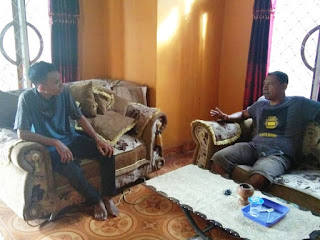 Besides having computer training, I also intensely communicated with the community about the economic efforts done by the people using village natural resources, one of which was seaweed cultivation and swallow nests. From this dialogue I discovered new things about the potency of my village and the obstacles faced by the people to develop seaweed and swallow nests. It is normal because in reality the human resources in the village is very limited, but actually they have eagerness to learn.
Besides having computer training, I also intensely communicated with the community about the economic efforts done by the people using village natural resources, one of which was seaweed cultivation and swallow nests. From this dialogue I discovered new things about the potency of my village and the obstacles faced by the people to develop seaweed and swallow nests. It is normal because in reality the human resources in the village is very limited, but actually they have eagerness to learn.
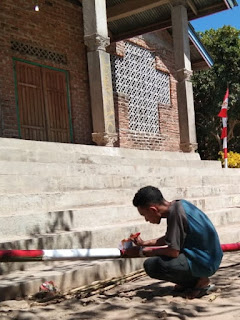 As a student, I felt satisfied and proud when I had a chance to share my knowledge to village officials and they learned it enthusiastically. I started to realize and felt sad because many young people from my village who were studying in colleges, they did nothing during their home return in campus break. They did not use their time to transfer their knowledge to their community. Actually the village officials expected positive contribution from the students who study in different place to build their villages.
As a student, I felt satisfied and proud when I had a chance to share my knowledge to village officials and they learned it enthusiastically. I started to realize and felt sad because many young people from my village who were studying in colleges, they did nothing during their home return in campus break. They did not use their time to transfer their knowledge to their community. Actually the village officials expected positive contribution from the students who study in different place to build their villages.
Hopefully my activities will be useful and the quality of village officials will be improved, especially to operate computers to serve the community and it will awake students’ awareness to serve the community through knowledge transfer for mutual development.
Maintaining Tolerance in East Sumba Participant’s reflection on Exploring Sumba program (Mutiara Srikandi)
Thursday, 14 November 2019by adminstube
 In Sumba I stayed at Elisabeth Uru Ndaya’ house, one of the activists of Stube-HEMAT Yogyakarta who had returned home, in Karunggu village, Nggaha Ori Angu district (Nggoa), East Sumba. Staying in a traditional Sumba house was a memorable experience because when I arrived the temperature was freezing, so we had to use a four-layers blanket, but I liked it. A woman who was familiarly called 'mama Domi' was always carefully asking about the menu for me. She was hesitant to prepare corn rice because she was afraid I did not like it. She told me that when she cooked she separated cooking utensils away from animals, because dogs and pigs roamed around the house, even she explained in detail to convince me that the food served was prepared based on Islamic law.
In Sumba I stayed at Elisabeth Uru Ndaya’ house, one of the activists of Stube-HEMAT Yogyakarta who had returned home, in Karunggu village, Nggaha Ori Angu district (Nggoa), East Sumba. Staying in a traditional Sumba house was a memorable experience because when I arrived the temperature was freezing, so we had to use a four-layers blanket, but I liked it. A woman who was familiarly called 'mama Domi' was always carefully asking about the menu for me. She was hesitant to prepare corn rice because she was afraid I did not like it. She told me that when she cooked she separated cooking utensils away from animals, because dogs and pigs roamed around the house, even she explained in detail to convince me that the food served was prepared based on Islamic law.
No Surrender
though being separated
(Way of blessing through green beans
and toasted bread)
Herisen Witno Ngongare
Monday, 28 October 2019by adminstube
Per Angusta Ad Augusta
Tuesday, 22 October 2019by adminstube
 As an institution for mentoring students from various regions in Indonesia who studying in Yogyakarta, Stube-HEMAT understands that students going to study in this city bring their own burden on their shoulders. Hopes of success both from oneself and family, as well as relatives and local community become one of them. While during their study, they face competition, challenges, complexity, demands for high standard of human resources and changes that could obstruct them in realizing hopes of success. Many sad cases occurred in the midst of the process of realizing hopes, such as depression and even suicide. Through the Training on Learning from Failure with the title 'Per Angusta Ad Augusta' at Villa Taman Eden 1, Kaliurang, 18-20 October 2019, Stube-HEMAT invited students to build optimism to face all challenges especially how to respond failure.
As an institution for mentoring students from various regions in Indonesia who studying in Yogyakarta, Stube-HEMAT understands that students going to study in this city bring their own burden on their shoulders. Hopes of success both from oneself and family, as well as relatives and local community become one of them. While during their study, they face competition, challenges, complexity, demands for high standard of human resources and changes that could obstruct them in realizing hopes of success. Many sad cases occurred in the midst of the process of realizing hopes, such as depression and even suicide. Through the Training on Learning from Failure with the title 'Per Angusta Ad Augusta' at Villa Taman Eden 1, Kaliurang, 18-20 October 2019, Stube-HEMAT invited students to build optimism to face all challenges especially how to respond failure.
Rev. Bambang Sumbodo, M.Min, the Stube-HEMAT board, opened the training by inviting students to be wise in making decisions. Making decisions is not easy. There are several types of decision making, namely, first, to make decision carelessly that tends to his own safety; second, to decide by considering the profit and loss of the decision, the most profitable will be taken; third, to make decision by considering the motivation of decision, based on true motivation. Nelson Mandela is one example of a decision maker based on true motivation, even though he had to bear 27 years in prison for his anti-racial struggle and discrimination in South Africa.
Scoring the Goal of Unity (Celebrating differences through Futsal)
Monday, 23 September 2019by adminstube
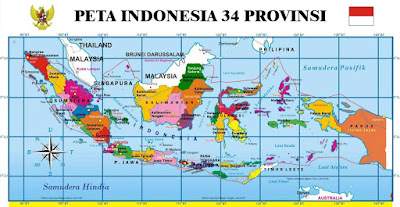 Diversity is both wealth and backfire. Wealth because of its variousity and on the other side it is a backfire because of its potency to trigger conflict among their differences. Many elements of society try to educate that diversity is a very valuable asset and should be the pride of the nation and state. Responding to the rampant diversity issues, Stube-HEMAT took part in maintaining intimacy and unity all Stube-HEMAT activists from various regions in Indonesia from Sabang to Merauke from Miangas to Rote Island by playing futsal at Telaga Futsal 1, Babarsari, Yogyakarta on Saturday September 21, 2019.
Diversity is both wealth and backfire. Wealth because of its variousity and on the other side it is a backfire because of its potency to trigger conflict among their differences. Many elements of society try to educate that diversity is a very valuable asset and should be the pride of the nation and state. Responding to the rampant diversity issues, Stube-HEMAT took part in maintaining intimacy and unity all Stube-HEMAT activists from various regions in Indonesia from Sabang to Merauke from Miangas to Rote Island by playing futsal at Telaga Futsal 1, Babarsari, Yogyakarta on Saturday September 21, 2019.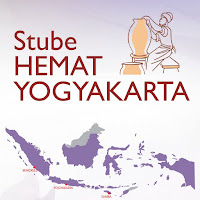 Sport is a choice as a means to unite everyone in one field. From sports like futsal, people can learn the importance of teamwork regardless of origin, religion, ethnicity or race. The participants who were invited welcomed enthusiastically and attended it on time starting at 16.00 WIB wearing complete costumes. Thirty three students from various regions, religions and study backgrounds participated in this sport.
Sport is a choice as a means to unite everyone in one field. From sports like futsal, people can learn the importance of teamwork regardless of origin, religion, ethnicity or race. The participants who were invited welcomed enthusiastically and attended it on time starting at 16.00 WIB wearing complete costumes. Thirty three students from various regions, religions and study backgrounds participated in this sport.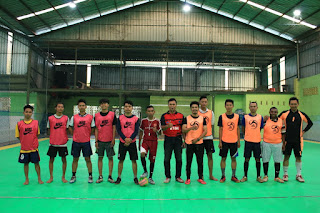 The men's team played in the second round and was divided into 2 teams with each team consisting of 8-10 people. Participants who played came from Halmahera, Maluku, Maybrat, Raja Ampat, Sulawesi, Sumba, Flores, Bogor, Cilacap, Bengkulu, Palembang and Lampung. Besides that they were from various campuses in Jogja such as UIN, UNPROK, ITY, UBSI, UJB, UST & STAK Marturia.
The men's team played in the second round and was divided into 2 teams with each team consisting of 8-10 people. Participants who played came from Halmahera, Maluku, Maybrat, Raja Ampat, Sulawesi, Sumba, Flores, Bogor, Cilacap, Bengkulu, Palembang and Lampung. Besides that they were from various campuses in Jogja such as UIN, UNPROK, ITY, UBSI, UJB, UST & STAK Marturia.Strengthening Network and Exploring Life in Indonesia
Saturday, 31 August 2019by adminstube
 This program gave participants opportunity to understand the reality of students’ life in Indonesia, the cultural diversity, issues and challenges related to natural resources; to observe sustainable alternative farming practices; and to engage in interfaith dialogue. SCMI participants consisted of two facilitators and seven students, namely, Tolly Yeptho, Rebekah Rajkumar, Larihun Lyngdoh, Minta Varghese, Santhi Perusetti, Sharon Christy, Imlikokba Kichu and two facilitators, namely, Inbaraj Jeyakumar and Ibatista Shylla.
This program gave participants opportunity to understand the reality of students’ life in Indonesia, the cultural diversity, issues and challenges related to natural resources; to observe sustainable alternative farming practices; and to engage in interfaith dialogue. SCMI participants consisted of two facilitators and seven students, namely, Tolly Yeptho, Rebekah Rajkumar, Larihun Lyngdoh, Minta Varghese, Santhi Perusetti, Sharon Christy, Imlikokba Kichu and two facilitators, namely, Inbaraj Jeyakumar and Ibatista Shylla.
 As an introduction to culture and history, Indian students had an opportunity to visit Borobudur temple, the largest Buddhist temple in the world. As one of the world heritages, this temple is very majestic and unique where the formation of each stone interlocked each other so that the structure of the temple became stronger, while the ornaments and reliefs of the temple were carved in detail that made them amazed. Multicultural Training and Interfaith Dialogue in which dozens of students from various regions in Indonesia who study in Yogyakarta were gathered, became a valuable dialogue space because each participant from Indonesia and India learned and exchanged experiences about study, culture and life. The practice of writing batik typical of Yogyakarta, Indian 'henna'- a hand-painted art and typical Indian culinary such as puri, masala, chapati, yogurt or even chai tea completed the understanding of cultural aspects. Having dialogue with Indonesia Christian Student Movement (GMKI) and watching movie ‘Bumi and Manusia’ provided information about student movements and the history of Indonesians’ struggle during Dutch colonialism period, especially depicting the women’s life.
As an introduction to culture and history, Indian students had an opportunity to visit Borobudur temple, the largest Buddhist temple in the world. As one of the world heritages, this temple is very majestic and unique where the formation of each stone interlocked each other so that the structure of the temple became stronger, while the ornaments and reliefs of the temple were carved in detail that made them amazed. Multicultural Training and Interfaith Dialogue in which dozens of students from various regions in Indonesia who study in Yogyakarta were gathered, became a valuable dialogue space because each participant from Indonesia and India learned and exchanged experiences about study, culture and life. The practice of writing batik typical of Yogyakarta, Indian 'henna'- a hand-painted art and typical Indian culinary such as puri, masala, chapati, yogurt or even chai tea completed the understanding of cultural aspects. Having dialogue with Indonesia Christian Student Movement (GMKI) and watching movie ‘Bumi and Manusia’ provided information about student movements and the history of Indonesians’ struggle during Dutch colonialism period, especially depicting the women’s life.
 "This is my first time discovering a dry land farming system by processing unproductive land into productive one. I think this can be applied in India as an alternative farming on dry land and I want to share what I experienced in my area," said Imlikokba Kichu, one of the participants from India. There are many more experiences and positive impressions from SCMI students for the activities carried out in Indonesia such as city planning, cleanliness, facilities for the disabled, people hospitality and many others.
"This is my first time discovering a dry land farming system by processing unproductive land into productive one. I think this can be applied in India as an alternative farming on dry land and I want to share what I experienced in my area," said Imlikokba Kichu, one of the participants from India. There are many more experiences and positive impressions from SCMI students for the activities carried out in Indonesia such as city planning, cleanliness, facilities for the disabled, people hospitality and many others.Connecting Soul, Celebrating Diversity
Monday, 26 August 2019by adminstube
 Being smart in managing the existing differences in Indonesia is the key to the country's stability and guaranteeing the security of the citizens. Religious symbols, ethnicity, race or certain groups make people divided in variety of differences, also prejudice and radicalism will add to the freezing gap of communication and interaction among community members. The training with a title in Indonesian language: Menghubungkan Jiwa, Merayakan Perbedaan (Connecting Soul, Celebrating Diversity), is one of the contributions of Stube-HEMAT for this nation.
Being smart in managing the existing differences in Indonesia is the key to the country's stability and guaranteeing the security of the citizens. Religious symbols, ethnicity, race or certain groups make people divided in variety of differences, also prejudice and radicalism will add to the freezing gap of communication and interaction among community members. The training with a title in Indonesian language: Menghubungkan Jiwa, Merayakan Perbedaan (Connecting Soul, Celebrating Diversity), is one of the contributions of Stube-HEMAT for this nation. Stube-HEMAT Yogyakarta training on Multicultural Training and Interreligion Dialogue at Kukup Indah Hotel, Kukup beach area, Gunungkidul, Special Region of Yogyakarta, Friday-Sunday, August 23-25, 2019, became a forum for discussion and interaction of students from various regions studying in Yogyakarta. Delegations from Stube-HEMAT Bengkulu, activits of Stube-HEMAT Sumba and participants of South to South Program from Student Christian Movement of India (SCMI) took part in contributing ideas in the three-day training.
Stube-HEMAT Yogyakarta training on Multicultural Training and Interreligion Dialogue at Kukup Indah Hotel, Kukup beach area, Gunungkidul, Special Region of Yogyakarta, Friday-Sunday, August 23-25, 2019, became a forum for discussion and interaction of students from various regions studying in Yogyakarta. Delegations from Stube-HEMAT Bengkulu, activits of Stube-HEMAT Sumba and participants of South to South Program from Student Christian Movement of India (SCMI) took part in contributing ideas in the three-day training.
Wai Humba Festival We are not the Sumba toward Extinction
Saturday, 24 August 2019by adminstube
“Sandinganeng” We Are Friends
Thursday, 22 August 2019by adminstube
 The Sangihe people who were previously migrants, now have become native residents of Halmahera and have contributed to ideas in supporting the progress of the village of Silalayang. The involvement of Sangihe and immigrants in Silalayang village can be seen from the selection of Silalayang Village Heads. Robles Makatika, a mixed birth of Sangihe and Manado which was chosen as the Head of Silalayang Village. He is a leader with good visionary and has role model for young people today at Central Wasile.
The Sangihe people who were previously migrants, now have become native residents of Halmahera and have contributed to ideas in supporting the progress of the village of Silalayang. The involvement of Sangihe and immigrants in Silalayang village can be seen from the selection of Silalayang Village Heads. Robles Makatika, a mixed birth of Sangihe and Manado which was chosen as the Head of Silalayang Village. He is a leader with good visionary and has role model for young people today at Central Wasile.Poso In Sintuwu Maroso
Saturday, 17 August 2019by adminstube
Besides that, there is something interesting behind the philosophy of life among 'to Poso' (people of Poso) in Pamona local language, the word of 'Poso' in Indonesian means ‘broken out’, certainly it is contrast with the value upheld by people of Poso. It can be concluded that even though Poso faced intolerance issue, the people of Poso still keep the values of Sintuwu Maroso which mean, Tuwu Mombetuwunaka (respectful living), Tuwu Mombepatuwu (having mutual living) and Tuwu Mombesungko (giving help each other).
"Napurantano-tano Ranging Masiranggoman,
Tung pe Badanta Padao-dao Tonditta ma
Masigomgoman"
Friday, 16 August 2019by adminstube
Stube-HEMAT Mingles with Society
Thursday, 15 August 2019by adminstube
 Living together with community and learning local culture make life more meaningful wherever we are. Likewise Stube-HEMAT in the midst of Yogyakarta society, especially RW 19, Nyutran, always takes part in social dynamics. As in activity to welcome Indonesia's 74th independence, Stube-HEMAT participated in "Cultural Dialogue" event on August 14, 2019, at the residence of Empu Keris (heirloom expert of Keris), Eko Supriyono. It issued three topics namely; Understanding the philosophical axis of Yogyakarta, the History of kampong Nyutran, and the Keris.
Living together with community and learning local culture make life more meaningful wherever we are. Likewise Stube-HEMAT in the midst of Yogyakarta society, especially RW 19, Nyutran, always takes part in social dynamics. As in activity to welcome Indonesia's 74th independence, Stube-HEMAT participated in "Cultural Dialogue" event on August 14, 2019, at the residence of Empu Keris (heirloom expert of Keris), Eko Supriyono. It issued three topics namely; Understanding the philosophical axis of Yogyakarta, the History of kampong Nyutran, and the Keris. The following topic was the history of kampung Nyutran by Endro Gunawan, the umpteenth generation of native residents who formerly lived in this kampong. Originally the place seemed a Madura soldier base camp, which was named the Nyutra soldier. The soldier became one group of soldiers of Yogyakarta Sultanate coming from various regions and islands in the archipelago to support the Sultan.
The following topic was the history of kampung Nyutran by Endro Gunawan, the umpteenth generation of native residents who formerly lived in this kampong. Originally the place seemed a Madura soldier base camp, which was named the Nyutra soldier. The soldier became one group of soldiers of Yogyakarta Sultanate coming from various regions and islands in the archipelago to support the Sultan.

 Continuing the history of the kampong, the dialogue about the heirloom of Keris conveyed by Eko Supriyono is no less interesting. Hundreds, even thousands of keris has been produced from his hand since 1979. Eko Supriyono explained about the type of warangka (the keris storage) and also every shape of warangka has its own name. In the process, Indonesian-made keris was registered at UNESCO as one of the World Cultural Heritage in 2005.
Continuing the history of the kampong, the dialogue about the heirloom of Keris conveyed by Eko Supriyono is no less interesting. Hundreds, even thousands of keris has been produced from his hand since 1979. Eko Supriyono explained about the type of warangka (the keris storage) and also every shape of warangka has its own name. In the process, Indonesian-made keris was registered at UNESCO as one of the World Cultural Heritage in 2005.
 Indonesia has been independent for 74 years, and the common reflection for such period is what contribution we can make for our nation and country? Loving culture, respecting one another and continuing to support one another are our choices, because our duty is opening chances for the birth of wise leaders regardless of ethnicity, race or religion. Let us be united because we are Indonesia which is full of diverse customs and local history. (SAP).
Indonesia has been independent for 74 years, and the common reflection for such period is what contribution we can make for our nation and country? Loving culture, respecting one another and continuing to support one another are our choices, because our duty is opening chances for the birth of wise leaders regardless of ethnicity, race or religion. Let us be united because we are Indonesia which is full of diverse customs and local history. (SAP).Ngerti, Ngrasa, Nglakoni Understanding, Having Emphaty and Experiencing
Tuesday, 13 August 2019by adminstube
 It should be admitted that there are various suggestions, advice and expressions that live and flourish in the midst of Javanese society. One of them is ‘Ngerti, Ngrasa and Nglakoni’. This advice was expressed by Ki Hadjar Dewantara, an Indonesian education figure and founder of Tamansiwa.
It should be admitted that there are various suggestions, advice and expressions that live and flourish in the midst of Javanese society. One of them is ‘Ngerti, Ngrasa and Nglakoni’. This advice was expressed by Ki Hadjar Dewantara, an Indonesian education figure and founder of Tamansiwa.This is a person's attempt to obtain knowledge of something that wants to be known or unintentional through the five senses. In this cognitive aspect hed/she will be able to recognize something, identify and make a concept from the new knowledge that he/she acquired.
This is the phase of affection where someone feels and lives up to what he/she already knows, not just knowing but finding meaning in it. This can be seen from the change in attitude because of new knowledge that has been obtained before.
Global Interaction For Sustainable Development
Sunday, 11 August 2019by adminstube
 Global interaction is inevitable, and even becomes requirements, especially for students having advantage from technology advancements that enable communication and encounter limitation because of distance, space and time among people to transfer knowledge, to add experience and to expand networks for the improvement of human life quality itself based on the indicators of sustainable development purposes. Stube-HEMAT Yogyakarta as a student mentoring institution opened to be the host students for students group from Department of Sociology at Gottfried Wilhelm Leibniz University, Hannover. They learned Indonesia sustainable development, in Yogyakarta on August 8-10, 2019.
Global interaction is inevitable, and even becomes requirements, especially for students having advantage from technology advancements that enable communication and encounter limitation because of distance, space and time among people to transfer knowledge, to add experience and to expand networks for the improvement of human life quality itself based on the indicators of sustainable development purposes. Stube-HEMAT Yogyakarta as a student mentoring institution opened to be the host students for students group from Department of Sociology at Gottfried Wilhelm Leibniz University, Hannover. They learned Indonesia sustainable development, in Yogyakarta on August 8-10, 2019. This activity became a means for Indonesian and German students to deepen their understanding of different cultures and political systems, share ideas and experiences related to aspects of sustainable development, such as health, environmental education and others. Stube-HEMAT Executive Director, Ariani Narwastujati, S.Pd, S.S, M.Pd, welcomed them and explained about the city of Yogyakarta through video and promoting the philosophical axis of the city. The Coordinator of Stube-HEMAT Yogyakarta, Trustha told about Stube-HEMAT activities in Yogyakarta, Sumba and Bengkulu. Andreas Kurschat, group coordinator from Hannover, introduced the group and explained the purpose of coming to Indonesia with several students to observe the social life and health of the Indonesian people, especially in Semarang, Central Java and to learn cultural uniqueness in Yogyakarta with Stube-HEMAT.
This activity became a means for Indonesian and German students to deepen their understanding of different cultures and political systems, share ideas and experiences related to aspects of sustainable development, such as health, environmental education and others. Stube-HEMAT Executive Director, Ariani Narwastujati, S.Pd, S.S, M.Pd, welcomed them and explained about the city of Yogyakarta through video and promoting the philosophical axis of the city. The Coordinator of Stube-HEMAT Yogyakarta, Trustha told about Stube-HEMAT activities in Yogyakarta, Sumba and Bengkulu. Andreas Kurschat, group coordinator from Hannover, introduced the group and explained the purpose of coming to Indonesia with several students to observe the social life and health of the Indonesian people, especially in Semarang, Central Java and to learn cultural uniqueness in Yogyakarta with Stube-HEMAT. The practice of doing ‘batik’ became the first experience for students from Hannover, to appreciate the Javanese cultural heritage that UNESCO has recognized as the world heritage. The team of Stube-HEMAT accompanied them to make batik starting from determining patterns and drawing on fabric. They showed enthusiasm since the first time and poured liquid wax into cloth using ‘canting’ carefully. Even though the wax dripped outside the pattern lines several times, it did not dampen their spirits and continued to dye batik using the ‘colet’ technique.
The practice of doing ‘batik’ became the first experience for students from Hannover, to appreciate the Javanese cultural heritage that UNESCO has recognized as the world heritage. The team of Stube-HEMAT accompanied them to make batik starting from determining patterns and drawing on fabric. They showed enthusiasm since the first time and poured liquid wax into cloth using ‘canting’ carefully. Even though the wax dripped outside the pattern lines several times, it did not dampen their spirits and continued to dye batik using the ‘colet’ technique. The discussion with Bethesda Community Development in Yogyakarta, as one community assistance to improve the quality of health, gave participants an understanding about Healthy Indonesia Program through Family Approach (PIS-PK) which is realized by mentoring the health services for mothers, infants and families, nutritional adequacy and availability of health service facilities in several villages in East Sumba regency, Alor regency and Malaka regency. Those three areas are in East Nusa Tenggara Province.
The discussion with Bethesda Community Development in Yogyakarta, as one community assistance to improve the quality of health, gave participants an understanding about Healthy Indonesia Program through Family Approach (PIS-PK) which is realized by mentoring the health services for mothers, infants and families, nutritional adequacy and availability of health service facilities in several villages in East Sumba regency, Alor regency and Malaka regency. Those three areas are in East Nusa Tenggara Province.
 Campus attention about the quality of public health was discussed with Medical Faculty of Duta Wacana Christian University in Yogyakarta, and doctor Teguh Kristian Perdamaian, who gives lecture in General Medicine and Public Health Sciences. He revealed the reasons why a person postpones health matters such as insurance, periodic examinations and medication. The reasons are ( 1) low education, due to low literacy and lack of health promotions, (2) financial limitations, related to non-medical issues such as transportation costs, accommodation during medical care and loss of income, (3) family and cultural influences, related with family decisions, culture background and alternative medicine, and (4) psychological aspects, such as emotional constraints and people's perception on their disease.
Campus attention about the quality of public health was discussed with Medical Faculty of Duta Wacana Christian University in Yogyakarta, and doctor Teguh Kristian Perdamaian, who gives lecture in General Medicine and Public Health Sciences. He revealed the reasons why a person postpones health matters such as insurance, periodic examinations and medication. The reasons are ( 1) low education, due to low literacy and lack of health promotions, (2) financial limitations, related to non-medical issues such as transportation costs, accommodation during medical care and loss of income, (3) family and cultural influences, related with family decisions, culture background and alternative medicine, and (4) psychological aspects, such as emotional constraints and people's perception on their disease.Faramau re Fatenow Farumi The Phrase of Unity
Monday, 5 August 2019by adminstube
 The capital city of Maba distric is Buli Village. Maba distric has 408,50 km square large (six percent for all East Halmahera), and it is located approximately 46.66 km away from the capital of East Halmahera Regency. Maba district consisted of 10 villages namely Buli, Buli Asal, Buli Karya, Wayafli, Geltoli, Sailal, Pekaulang, Teluk Buli, Gamesan and Baburino. The last three names are new villages which were formed at the end of 2012 (https://haltimkab.go.id/kecamatan-maba/).
The capital city of Maba distric is Buli Village. Maba distric has 408,50 km square large (six percent for all East Halmahera), and it is located approximately 46.66 km away from the capital of East Halmahera Regency. Maba district consisted of 10 villages namely Buli, Buli Asal, Buli Karya, Wayafli, Geltoli, Sailal, Pekaulang, Teluk Buli, Gamesan and Baburino. The last three names are new villages which were formed at the end of 2012 (https://haltimkab.go.id/kecamatan-maba/). In addition to local Buli ethnic group who are Christians and Muslims, there are also a number of migrant ethnic groups, including Maba, Bugis, Sangir, Tobelo, Toraja, Java and some migrants from other Halmahera regions. Besides that, the biggest religion is Christian and Islam which still dominate this area. Buli is a rich with nickel, gold and copper mines. Since 1997 the Geomin Drilling Company has entered this area and has an office in Buli Village (now the village of Geltoly; which means intersection). In addition to the mining companies there are also Post Offices and several other Expeditions such as JNE and Lion Parcel to support the online buying and selling infrastructure in Buli. The office of the East Halmahera Regional Police Chief is still in Buli Village, not in the Regency Capital. In addition, there are currently 1 gas station, several shops and markets that sell clothing and also markets for fresh fish and vegetables to meet the people needs.
In addition to local Buli ethnic group who are Christians and Muslims, there are also a number of migrant ethnic groups, including Maba, Bugis, Sangir, Tobelo, Toraja, Java and some migrants from other Halmahera regions. Besides that, the biggest religion is Christian and Islam which still dominate this area. Buli is a rich with nickel, gold and copper mines. Since 1997 the Geomin Drilling Company has entered this area and has an office in Buli Village (now the village of Geltoly; which means intersection). In addition to the mining companies there are also Post Offices and several other Expeditions such as JNE and Lion Parcel to support the online buying and selling infrastructure in Buli. The office of the East Halmahera Regional Police Chief is still in Buli Village, not in the Regency Capital. In addition, there are currently 1 gas station, several shops and markets that sell clothing and also markets for fresh fish and vegetables to meet the people needs.
 The Buli area can survive and not to be affected by any riots at all because the local wisdom of "Faramaw re Fatenow Farumi" which means "being brothers and sisters", “We Are Family" was echoed by the elders of Buli area. The motto has unified people and kept to be life by all communities in Buli local area. Because it was the local wisdom that made Buli or Maba District were safe from the 1999/2000 riots. The motto is always spoken as the opening greeting in speeches at major events in the villages. The unifying language proved to be able to unite all ethnic groups, religions and race who lived and settled in Bulli area. In the village of Buli Asal, official ceremonies like weddings or releasing and welcoming pastors, the phrase above is still used as opening speeches.
The Buli area can survive and not to be affected by any riots at all because the local wisdom of "Faramaw re Fatenow Farumi" which means "being brothers and sisters", “We Are Family" was echoed by the elders of Buli area. The motto has unified people and kept to be life by all communities in Buli local area. Because it was the local wisdom that made Buli or Maba District were safe from the 1999/2000 riots. The motto is always spoken as the opening greeting in speeches at major events in the villages. The unifying language proved to be able to unite all ethnic groups, religions and race who lived and settled in Bulli area. In the village of Buli Asal, official ceremonies like weddings or releasing and welcoming pastors, the phrase above is still used as opening speeches.Learning Tolerance From Lamaholot Culture
Thursday, 1 August 2019by adminstube
Exploring Local Potency for Waropen Batik Design
Saturday, 6 July 2019by adminstube
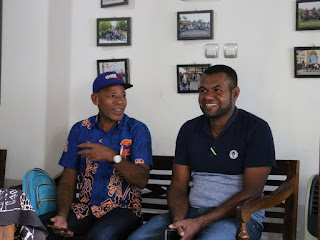 The desire to be independent as an entrepreneur became a meeting point between Stube-HEMAT, as a human resource development institution with Youth and Sports Office of Waropen Regency, Papua, which sent its youth to learn batik and productive businesses based on batik in Yogyakarta on July 2-4, 2019. The meeting of these two institutions cannot be separated with Roni Kayai’s role who had attended Stube-HEMAT Yogyakarta training when he studied in this city around 2006.
The desire to be independent as an entrepreneur became a meeting point between Stube-HEMAT, as a human resource development institution with Youth and Sports Office of Waropen Regency, Papua, which sent its youth to learn batik and productive businesses based on batik in Yogyakarta on July 2-4, 2019. The meeting of these two institutions cannot be separated with Roni Kayai’s role who had attended Stube-HEMAT Yogyakarta training when he studied in this city around 2006.
 Participants began their exposure by visiting Yogyakarta Batik Museum located on Dr. Sutomo street no 13 A, Bausasran. With great attention, they listened to the museum staff explanation of the history of batik in Yogyakarta, Surakarta and on the north coast of Java which was influenced by other nations. Initially batik was used only by certain groups but now common people can use it. They also observed batik motifs that imply hidden messages or prayers from the creator and the users. For example an appropriate motif and moment, like ‘Sidoasih’ motif which is worn at the wedding, and ’Gringsing’ motif which is used when people are ill.
Participants began their exposure by visiting Yogyakarta Batik Museum located on Dr. Sutomo street no 13 A, Bausasran. With great attention, they listened to the museum staff explanation of the history of batik in Yogyakarta, Surakarta and on the north coast of Java which was influenced by other nations. Initially batik was used only by certain groups but now common people can use it. They also observed batik motifs that imply hidden messages or prayers from the creator and the users. For example an appropriate motif and moment, like ‘Sidoasih’ motif which is worn at the wedding, and ’Gringsing’ motif which is used when people are ill.
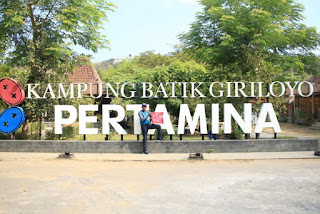 Kampung Batik Giriloyo, which has long been known as the center of traditional batik was the next place of learning. Said Romli (the person in charge for marketing division of the community) and Isnaini Muhtarom (Chairperson of Batik Giriloyo Community, as well as the head of the village) welcomed the participants and delivered an introduction, "Giriloyo batik center actually supports thousands of people in this area. This association gathers dozens of batik studios in Giriloyo so that they have competitiveness in the market and this gallery is a showroom to display collections of batik that mostly uses natural dyes," he explained.
Kampung Batik Giriloyo, which has long been known as the center of traditional batik was the next place of learning. Said Romli (the person in charge for marketing division of the community) and Isnaini Muhtarom (Chairperson of Batik Giriloyo Community, as well as the head of the village) welcomed the participants and delivered an introduction, "Giriloyo batik center actually supports thousands of people in this area. This association gathers dozens of batik studios in Giriloyo so that they have competitiveness in the market and this gallery is a showroom to display collections of batik that mostly uses natural dyes," he explained.
Sustainable Development Goals Our joint responsibility
Saturday, 18 May 2019by adminstube
 These five objectives are the focus of Sayangi Tunas Cilik Foundation or Save the Children by conducting several dialogues with young people in Soppeng, South Sulawesi and Yogyakarta, in the middle of March 2019. The dialogue called ‘Youth Consultation for the SDGs’ was accomplished by sending several representatives to Jakarta to have an audience with the National Development Planning Institution (BAPPENAS) with a hope to deliver the results of consultations that have been carried out for two days in each cities.
These five objectives are the focus of Sayangi Tunas Cilik Foundation or Save the Children by conducting several dialogues with young people in Soppeng, South Sulawesi and Yogyakarta, in the middle of March 2019. The dialogue called ‘Youth Consultation for the SDGs’ was accomplished by sending several representatives to Jakarta to have an audience with the National Development Planning Institution (BAPPENAS) with a hope to deliver the results of consultations that have been carried out for two days in each cities.
The audience was expected to bring benefit for both parties and ended by gratitude closing from Tata Sudrajad, the Director of Advocacy and Campaign, Sayangi Tunas Cilik Foundation and then they took pictures together. (SAP).
Family, Problems and Solutions Parenting Skills Program
Monday, 13 May 2019by adminstube
 Family is the main foundation of the strength of one nation and state. Thus, knowledge of parenting and good relationship among family members, especially parents and children is not a trivial thing, moreover young people's lifestyle is more and more free. That’s why Stube-HEMAT Yogyakarta innitiatted to hold the training. Some other reasons are; first, every student had experienced their parents’ parenting style with a variety of situations and backgrounds that affected their life and soul that will also bring influences in the parenting style for the next offsprings; second, each student will face two choices of having a family or to be single with its each consequences. Each choice requires preparation and readiness.
Family is the main foundation of the strength of one nation and state. Thus, knowledge of parenting and good relationship among family members, especially parents and children is not a trivial thing, moreover young people's lifestyle is more and more free. That’s why Stube-HEMAT Yogyakarta innitiatted to hold the training. Some other reasons are; first, every student had experienced their parents’ parenting style with a variety of situations and backgrounds that affected their life and soul that will also bring influences in the parenting style for the next offsprings; second, each student will face two choices of having a family or to be single with its each consequences. Each choice requires preparation and readiness.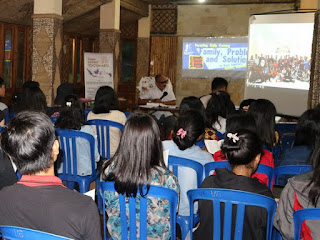 The training was attended by thirty students who gathered at Griya Sejahtera, Ngablak, Magelang (10-12/ 05/2019). They came from various regions in Indonesia who are studying in Yogyakarta. Despite having various study backgrounds, they were enthusiastic in participating in the training. The facilitators shared their knowledge and experience according to their respective competencies. As a biblical basis, Rev. Bambang Sumbodo, reminded participants of the threat of modern lifestyles to Christian families todays by taking the story of Moses and his family. Moses, who acted as the liberator of the Israelites from slavery at that time, must be very busy. By looking at the story of Imam Jethro's visit, Jethro is Moses' father-in-law, to the family of Moses, participants learned the need of mutual support and interaction between family members. Moses' success cannot be separated from the support of his family members.
The training was attended by thirty students who gathered at Griya Sejahtera, Ngablak, Magelang (10-12/ 05/2019). They came from various regions in Indonesia who are studying in Yogyakarta. Despite having various study backgrounds, they were enthusiastic in participating in the training. The facilitators shared their knowledge and experience according to their respective competencies. As a biblical basis, Rev. Bambang Sumbodo, reminded participants of the threat of modern lifestyles to Christian families todays by taking the story of Moses and his family. Moses, who acted as the liberator of the Israelites from slavery at that time, must be very busy. By looking at the story of Imam Jethro's visit, Jethro is Moses' father-in-law, to the family of Moses, participants learned the need of mutual support and interaction between family members. Moses' success cannot be separated from the support of his family members.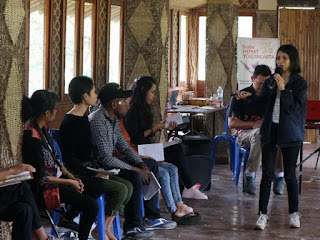 Next, Anggraeni Upik Pratiwi, S.Psi., shared Tips to Choose the Ideal Life Spouse, based on Psychological aspects, which include, first, to recognize oneself, both strengths and weaknesses; second, to determine the criteria of the expected spouse. Upik emphasized the importance of awareness of criteria that cannot be changed, for example physical and ethnic or descent, while the nature and hobbies are changeable; and third, expanding interactions to meet many people and know them deeply.
Next, Anggraeni Upik Pratiwi, S.Psi., shared Tips to Choose the Ideal Life Spouse, based on Psychological aspects, which include, first, to recognize oneself, both strengths and weaknesses; second, to determine the criteria of the expected spouse. Upik emphasized the importance of awareness of criteria that cannot be changed, for example physical and ethnic or descent, while the nature and hobbies are changeable; and third, expanding interactions to meet many people and know them deeply. Technological advances affect family life, both ways of communication and interaction in the family. It is like two sides of a coin, on one side, technological advances make a person able to access unlimited information, even the person tends to be individualistic, but on the other side, it is useful, such as for marketing family business, or doing face-to-face communication even though from a distance. Those were stated by Dr. Murti Lestari, M.Sc, UKDW Business Faculty lecturer and economics practitioner.
Technological advances affect family life, both ways of communication and interaction in the family. It is like two sides of a coin, on one side, technological advances make a person able to access unlimited information, even the person tends to be individualistic, but on the other side, it is useful, such as for marketing family business, or doing face-to-face communication even though from a distance. Those were stated by Dr. Murti Lestari, M.Sc, UKDW Business Faculty lecturer and economics practitioner.
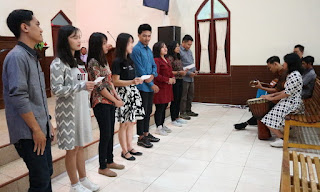 On the last day of the training, togetherness with the GKJ Gumuk congregation became a complement to the series of activities, where participants had opportunities to offer praise in Sunday worship and donate books and props for Sunday school.
On the last day of the training, togetherness with the GKJ Gumuk congregation became a complement to the series of activities, where participants had opportunities to offer praise in Sunday worship and donate books and props for Sunday school.
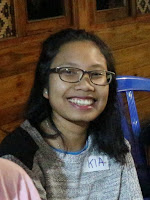 As the output of the training, the participants wrote experiences of children in their origin and the family struggles they have ever observed. Riskia Gusta Nita, a student of STAK Marturia, from Lampung revealed, "This training approached the inner side of the participants. This is good because sometimes we do not understand ourselves, then we learned how to choose a spouse and design our future. I thing it is important to share what I get and feel during the training to other friends in my environment."
As the output of the training, the participants wrote experiences of children in their origin and the family struggles they have ever observed. Riskia Gusta Nita, a student of STAK Marturia, from Lampung revealed, "This training approached the inner side of the participants. This is good because sometimes we do not understand ourselves, then we learned how to choose a spouse and design our future. I thing it is important to share what I get and feel during the training to other friends in my environment."
Writing and Uncovering Anxiety Student Workshop on Writing Fiction
Thursday, 2 May 2019by adminstube
 Writing activity that’s going along with one's life can be found from writing activities in the form of status and comments on social media, short messages, campus assignments and thesis. But there are also people who do not write anything to public for lack-confidence reason, unfamiliarity and fear. It should be understood that qualified writings come from practice and spirit not to give up easily. For this reason, Stube-HEMAT Yogyakarta in collaboration with the Master Degree of Literature Team of Gadjah Mada University held a Writing Fiction Workshop (Wednesday, 1/5/2019) at Stube-HEMAT Yogyakarta secretariat.
Writing activity that’s going along with one's life can be found from writing activities in the form of status and comments on social media, short messages, campus assignments and thesis. But there are also people who do not write anything to public for lack-confidence reason, unfamiliarity and fear. It should be understood that qualified writings come from practice and spirit not to give up easily. For this reason, Stube-HEMAT Yogyakarta in collaboration with the Master Degree of Literature Team of Gadjah Mada University held a Writing Fiction Workshop (Wednesday, 1/5/2019) at Stube-HEMAT Yogyakarta secretariat.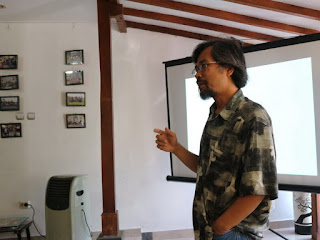 Achmad Munjid, M.A., Ph.D., a lecture at Faculty of Cultural Sciences, Gadjah Mada University, the workshop facilitator, was pleased to cooperate with Stube-HEMAT Yogyakarta because he could interact with students from various regions in Indonesia. He began the workshop with a question: "If someone goes to swim and the trainer only gives a theory book to swim, he will be able to plunge to the pool and swim or not? He must practice how to swim, moving his hands, feet and breathing. It is the same with writing activity. Theory is not enough! He must write and continue to sharpen his writing skills."
Achmad Munjid, M.A., Ph.D., a lecture at Faculty of Cultural Sciences, Gadjah Mada University, the workshop facilitator, was pleased to cooperate with Stube-HEMAT Yogyakarta because he could interact with students from various regions in Indonesia. He began the workshop with a question: "If someone goes to swim and the trainer only gives a theory book to swim, he will be able to plunge to the pool and swim or not? He must practice how to swim, moving his hands, feet and breathing. It is the same with writing activity. Theory is not enough! He must write and continue to sharpen his writing skills."
 "At first I liked writing diaries about my hearts and children stories, but I was shy and not confident when other people read them. However, in this workshop I got the answer that an author does not need to think about it. The important thing is writing down what is on my mind, telling the emotions and feelings, and ignoring reader comments. Now I am confident enough to write," said Marina, a student of Mercu Buana University, coming from Riung, Flores Island.
"At first I liked writing diaries about my hearts and children stories, but I was shy and not confident when other people read them. However, in this workshop I got the answer that an author does not need to think about it. The important thing is writing down what is on my mind, telling the emotions and feelings, and ignoring reader comments. Now I am confident enough to write," said Marina, a student of Mercu Buana University, coming from Riung, Flores Island.Spirit To Achieve The SDGs Target In 2030
Sunday, 31 March 2019by adminstube
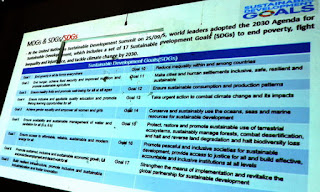 There were 8 main points to achiever until 2015, covering: (1) Eradicate extreme poverty and hunger; (2) Achieve universal primary education; (3) Promote gender equality and empower woman; (4) Reduce child mortality; (5) Improve maternal health; (6) Combat HIV/AIDS, malaria, and other diseases; (7) Ensure environmental sustainability; (8) Global partnership for development. In the process, the MDGs targets in Indonesia and in most countries in the world have not 100% achieved yet. The period of 15 years was not enough to meet the target, so UN country members agreed to continue the program called Sustainable Development Goals on September 2015 in New York. The achievement indicators of SDGs are more detailed in 17 points with an expectation that in 2030 all countries will be free from poverty, all children have qualified educational access with good infrastructure and human resource, and all countries may handle global climate change and problems of life sustainability and peace for all.
There were 8 main points to achiever until 2015, covering: (1) Eradicate extreme poverty and hunger; (2) Achieve universal primary education; (3) Promote gender equality and empower woman; (4) Reduce child mortality; (5) Improve maternal health; (6) Combat HIV/AIDS, malaria, and other diseases; (7) Ensure environmental sustainability; (8) Global partnership for development. In the process, the MDGs targets in Indonesia and in most countries in the world have not 100% achieved yet. The period of 15 years was not enough to meet the target, so UN country members agreed to continue the program called Sustainable Development Goals on September 2015 in New York. The achievement indicators of SDGs are more detailed in 17 points with an expectation that in 2030 all countries will be free from poverty, all children have qualified educational access with good infrastructure and human resource, and all countries may handle global climate change and problems of life sustainability and peace for all.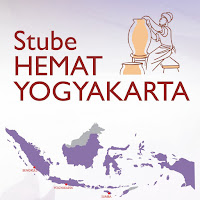 Related with Indonesia responsibility to UN in 2019, Stube-HEMAT Yogyakarta wants to take a part by collecting aspiration and problems faced by young people throughout the islands, as 90% Stube HEMAT activist are coming from outside Jawa Island.
Related with Indonesia responsibility to UN in 2019, Stube-HEMAT Yogyakarta wants to take a part by collecting aspiration and problems faced by young people throughout the islands, as 90% Stube HEMAT activist are coming from outside Jawa Island.The discussion held in Stube-HEMAT Yogyakarta secretary (31/03/2019) attended by 18 students and source person Dr. Murti Lestari, M.Si, Board-in charge of Stube-HEMAT, found that main obstacle is low quality of education bringing to low quality of human resource. Teacher quality, infrastructure, and school distance are main problems in many islands and remote areas throughout Indonesia. Further, un-renewable fuel like coal becomes agenda to reduce, to ensure environmental sustainability and ecosystem to get ideal climate, to reduce gas emission of greenhouse leading to the rise of sea level.
Spirit To Be Politics Literate Among Javanese Church Members of Panggang
Sunday, 31 March 2019by adminstube
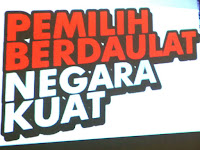 An intimate and warm atmosphere was felt when Stube-HEMAT Yogyakarta team met the assembly and church member of Javanese Christian Church (GKJ) at Watu Payung, Gunungkidul (Saturday, 03/30/2019) in an activity entitled 'Learning Together about Politics' to welcome Indonesia's democratic party namely General Election. The participants consisted of church assemblies, adult citizen commission, youth commission, church elders and comission of testimony and service.
An intimate and warm atmosphere was felt when Stube-HEMAT Yogyakarta team met the assembly and church member of Javanese Christian Church (GKJ) at Watu Payung, Gunungkidul (Saturday, 03/30/2019) in an activity entitled 'Learning Together about Politics' to welcome Indonesia's democratic party namely General Election. The participants consisted of church assemblies, adult citizen commission, youth commission, church elders and comission of testimony and service.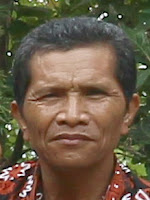 In his remarks, Prambudi Yakobus S, S.Pd, the chairman of the church assembly, expressed his gratitude that the collaboration network between the church and Stube-HEMAT Yogyakarta continues to exist until now and becomes valuable modal for church to grow in the future. Next, Elisabeth Uru Ndaya, S.Pd introduced Stube-HEMAT as a mentoring institution for Christian students in Yogyakarta that equips them as blessing for churches based on their expertise. The church member building program is a form of sharing the blessing of knowledge for many people.
In his remarks, Prambudi Yakobus S, S.Pd, the chairman of the church assembly, expressed his gratitude that the collaboration network between the church and Stube-HEMAT Yogyakarta continues to exist until now and becomes valuable modal for church to grow in the future. Next, Elisabeth Uru Ndaya, S.Pd introduced Stube-HEMAT as a mentoring institution for Christian students in Yogyakarta that equips them as blessing for churches based on their expertise. The church member building program is a form of sharing the blessing of knowledge for many people.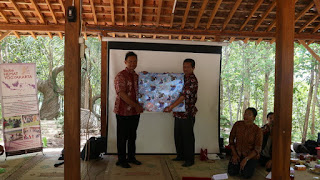 Furthermore, Trustha Rembaka, S.Th., revealed the history of church interaction with political power, starting from the time of Jesus and His disciples who were outside political power and even considered as rebels. In its development, the Christ belivers increased and they had their owned way of living such as living well in honesty and emphaty, and playing many roles in society. But the Roman authorities regarded this as a threat and began to hinder and persecute Christians. Nevertheless Christianity continued to develop, even at the end Christianity was adopted as the state religion. When Christianity began to mix with power, it began to lose its critical power gradually, to ignore humanity, poverty and injustice, because it had been already in comfort zone. The church reformation in 1517 became the peak of disgust for manipulative attitude of the church and leaders, then the reformation brought church back in voicing prophetic voices by struggling for humanity, alleviating poverty and fighting injustice.
Furthermore, Trustha Rembaka, S.Th., revealed the history of church interaction with political power, starting from the time of Jesus and His disciples who were outside political power and even considered as rebels. In its development, the Christ belivers increased and they had their owned way of living such as living well in honesty and emphaty, and playing many roles in society. But the Roman authorities regarded this as a threat and began to hinder and persecute Christians. Nevertheless Christianity continued to develop, even at the end Christianity was adopted as the state religion. When Christianity began to mix with power, it began to lose its critical power gradually, to ignore humanity, poverty and injustice, because it had been already in comfort zone. The church reformation in 1517 became the peak of disgust for manipulative attitude of the church and leaders, then the reformation brought church back in voicing prophetic voices by struggling for humanity, alleviating poverty and fighting injustice.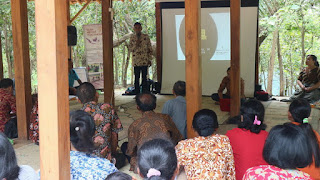 Sarloce Apang, S.T., invited church members to take actions for the nation. They should think not only the church, but also the interests of the nation. She reminded that church members should not be politically blind, unwilling to see, to hear, to speak and to participate in political events. Everyone should be aware that various national policies were the results of political decisions, so apathy and not care to political world would prevent this nation from progress. The last session delivered by Marianus YL Lejap was about 'I and Election' as introduction for participants to know parties competing in election, election organizers and observing presidential candidates, Regional Representative candidates, Legislative candidates for national level, provincial and regency of Gunung Kidul.
Sarloce Apang, S.T., invited church members to take actions for the nation. They should think not only the church, but also the interests of the nation. She reminded that church members should not be politically blind, unwilling to see, to hear, to speak and to participate in political events. Everyone should be aware that various national policies were the results of political decisions, so apathy and not care to political world would prevent this nation from progress. The last session delivered by Marianus YL Lejap was about 'I and Election' as introduction for participants to know parties competing in election, election organizers and observing presidential candidates, Regional Representative candidates, Legislative candidates for national level, provincial and regency of Gunung Kidul.
Understanding Politics with Millennial’s View Follow-up activity of PMKRI & Mercu Buana groups
Monday, 25 March 2019by adminstube
 To have political awareness of millennial group, campaign about it should be done continuously. This moment is used by afollow-up group called “ProductiveMilenial” belongs to Rusli, Riki, Marina, and Grace to campaign the importance of politics literacy among milenials. Having knowledge and information from Church and Politics training they followed before, they shared such topic with other student community. Placed at Nemo cafeNologaten (23/03/2019), it was started at 8.45 p.mwith 10 students coming from eastern Indonesia/NTTattended and actively participated on this small discussion.
To have political awareness of millennial group, campaign about it should be done continuously. This moment is used by afollow-up group called “ProductiveMilenial” belongs to Rusli, Riki, Marina, and Grace to campaign the importance of politics literacy among milenials. Having knowledge and information from Church and Politics training they followed before, they shared such topic with other student community. Placed at Nemo cafeNologaten (23/03/2019), it was started at 8.45 p.mwith 10 students coming from eastern Indonesia/NTTattended and actively participated on this small discussion. Mariano Lejap, a team member ofStube-HEMAT Yogyakarta having role as group assistant, explained about the background of the discussion and introduced the service of Stube-HEMAT, a student service that gives empowerment to students through training programs. Many themes are talked over in Stube HEMAT to enlarge knowledge and to enrich students with many experiences.
Mariano Lejap, a team member ofStube-HEMAT Yogyakarta having role as group assistant, explained about the background of the discussion and introduced the service of Stube-HEMAT, a student service that gives empowerment to students through training programs. Many themes are talked over in Stube HEMAT to enlarge knowledge and to enrich students with many experiences.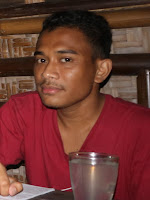 The discussion had 2 main topic, that is, millenial and political participation; and the relationship between church and local areas political situation. Marina, a communication student of MercubuanaUniversity in Yogyakarta led the discussion and all participants were actively shared their experiences in local areas public space and what they viewed on church and politics. Riki started with the understanding of millenial and their political participation nowadays. Was it still relevant with what Soekarno thought? “Now Millenial tends to have instant process in everything, they are more familiar with online application like kitabisa.comwhen they want to involve in public space to collect social fund for natural disaster victims or school renovation. They have left old pattern with complicated procedures”, Mariano told.
The discussion had 2 main topic, that is, millenial and political participation; and the relationship between church and local areas political situation. Marina, a communication student of MercubuanaUniversity in Yogyakarta led the discussion and all participants were actively shared their experiences in local areas public space and what they viewed on church and politics. Riki started with the understanding of millenial and their political participation nowadays. Was it still relevant with what Soekarno thought? “Now Millenial tends to have instant process in everything, they are more familiar with online application like kitabisa.comwhen they want to involve in public space to collect social fund for natural disaster victims or school renovation. They have left old pattern with complicated procedures”, Mariano told. In church and politics session, Rusli, an agriculture student of Sarjanawiyata University, as the discussion angler, asked the forum with a question. Will churches be involved in such issue of government policy that is rejected by the people because it doesn’t stand with them? Will churches be involved in politics?
In church and politics session, Rusli, an agriculture student of Sarjanawiyata University, as the discussion angler, asked the forum with a question. Will churches be involved in such issue of government policy that is rejected by the people because it doesn’t stand with them? Will churches be involved in politics? Grace, one participant from Atambua, NTT shared that pastors in her region had ever preached containing a persuasion that church members should not vote candidates who are not active in church activities. While she thought that the assessment of one candidate cannot rely on such issue but the track record of the candidate achievement for people and society. Religious leaders should not be involved in political practice. Otherwise, Yodi, a student of Management in Sanata Dharma University thought that church should be involved in politics based on the example of Pope in Rome who leads church and does governance administration of Vatican. He told further, “If a church wants to involve in politics, it is better that church members do it not the institution. Next, as young generation, it’s better for young millennial to take a part in church activities to decide church policies”.
Grace, one participant from Atambua, NTT shared that pastors in her region had ever preached containing a persuasion that church members should not vote candidates who are not active in church activities. While she thought that the assessment of one candidate cannot rely on such issue but the track record of the candidate achievement for people and society. Religious leaders should not be involved in political practice. Otherwise, Yodi, a student of Management in Sanata Dharma University thought that church should be involved in politics based on the example of Pope in Rome who leads church and does governance administration of Vatican. He told further, “If a church wants to involve in politics, it is better that church members do it not the institution. Next, as young generation, it’s better for young millennial to take a part in church activities to decide church policies”. As a closing session, all participants agree that millennial generation should care of politics and they may participate based on potency that millennial generally has that is identical with technology and information. [ML]
As a closing session, all participants agree that millennial generation should care of politics and they may participate based on potency that millennial generally has that is identical with technology and information. [ML]
SDG’s and the Role of the Youth
Monday, 25 March 2019by adminstube
 Ratna Yunita, an advisor from Save the Children Institute asked the participants to do a “river of life” by writing and describing issues or forms of injustice that they have encountered since their childhood until now. Afterwards, she explains the purposes and goals of SDG’s for youth and communities and the role of today’s youth. Ratna also explained the parameters of achievement, challenges for SDG’s implementation and emphasized that the government has created a coordination team up to regional level.
Ratna Yunita, an advisor from Save the Children Institute asked the participants to do a “river of life” by writing and describing issues or forms of injustice that they have encountered since their childhood until now. Afterwards, she explains the purposes and goals of SDG’s for youth and communities and the role of today’s youth. Ratna also explained the parameters of achievement, challenges for SDG’s implementation and emphasized that the government has created a coordination team up to regional level.Being Politically Literate and Actively Participate in Church Sumba Student Discussion about Church and Politics
Friday, 15 March 2019by adminstube
 The follow- up of Stube-HEMAT Yogyakarta training on Church and Politics with a theme Young, Millennial and Politically Literate held last February 2019, awakened participants’ heart to share their experiences. The 'follow-up' group from Sumba took initiative to invite fifteen students to have a small discussion about political situation and church's role in politics in Sumba, at Kebun Laras café, Balirejo (03/14/2019).
The follow- up of Stube-HEMAT Yogyakarta training on Church and Politics with a theme Young, Millennial and Politically Literate held last February 2019, awakened participants’ heart to share their experiences. The 'follow-up' group from Sumba took initiative to invite fifteen students to have a small discussion about political situation and church's role in politics in Sumba, at Kebun Laras café, Balirejo (03/14/2019).
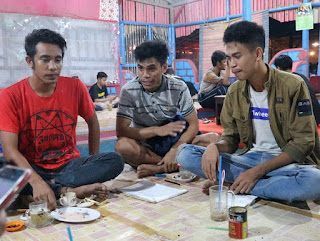 After giving understanding about politics, the group then discussed the extent of Sumba churches to contribute in politics. Tania Taka, a student of Gadjah Mada University, shared her experience that year by year churches in Sumba continuously gave understanding about good politics and remained neutral. She also explained that her father was a pastor and ever elected to be a member of house of representative in East Sumba, and many of his programs were successfully carried out.
After giving understanding about politics, the group then discussed the extent of Sumba churches to contribute in politics. Tania Taka, a student of Gadjah Mada University, shared her experience that year by year churches in Sumba continuously gave understanding about good politics and remained neutral. She also explained that her father was a pastor and ever elected to be a member of house of representative in East Sumba, and many of his programs were successfully carried out.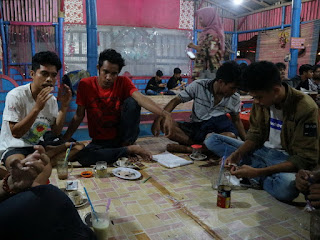 However, there were some participants who disagree if a pastor plunged into politics. Alan Mehakati, a Forestry student of Gadjah Mada University, said that pastor was actually a trusted person in community, if he involved in politics, it would affect the harmony of the congregation that he served. From the discussion, Tania Taka also explained that there was regulation in Sumba synod that pastors who involved in politics, were required to resign from their position in the congregation and were not allowed to preach.
However, there were some participants who disagree if a pastor plunged into politics. Alan Mehakati, a Forestry student of Gadjah Mada University, said that pastor was actually a trusted person in community, if he involved in politics, it would affect the harmony of the congregation that he served. From the discussion, Tania Taka also explained that there was regulation in Sumba synod that pastors who involved in politics, were required to resign from their position in the congregation and were not allowed to preach.Being Politically Literate Based On Information Literacy
Wednesday, 13 March 2019by adminstube
 Twenty two students of STAK Marturia attended the discussion. Four speakers, namely Christian Apri Wijaya (Vice secretary of DPD GAMKI DIY) delivered a topic on ‘Understanding Politics’; Sari Dwi Kristianto (STAK Marturia Yogyakarta Theology student) with a topic on ‘Church and Politics’; Erik Sihombing (Cadre Education Department of GMKI Yogyakarta) with a topic on ‘Election Socialization’; and Astiwijaya Setiandari Salmon (STAK Marturia Christian Education Student) with a topic on ‘Anticipating Hoax in Political Year’.
Twenty two students of STAK Marturia attended the discussion. Four speakers, namely Christian Apri Wijaya (Vice secretary of DPD GAMKI DIY) delivered a topic on ‘Understanding Politics’; Sari Dwi Kristianto (STAK Marturia Yogyakarta Theology student) with a topic on ‘Church and Politics’; Erik Sihombing (Cadre Education Department of GMKI Yogyakarta) with a topic on ‘Election Socialization’; and Astiwijaya Setiandari Salmon (STAK Marturia Christian Education Student) with a topic on ‘Anticipating Hoax in Political Year’. The participation of young generation in General Election on April 17, 2019, can be realized by voting for candidates for Indonesian leaders. As the closing statement of the discussion, the GSP group emphasized, ‘One voter greatly determines Indonesia to be more advanced in the future, and be sure to check the truth of the information obtained from media to avoid hoaxes’. Let us enjoy the democary party of Indonesia. (FAT).
The participation of young generation in General Election on April 17, 2019, can be realized by voting for candidates for Indonesian leaders. As the closing statement of the discussion, the GSP group emphasized, ‘One voter greatly determines Indonesia to be more advanced in the future, and be sure to check the truth of the information obtained from media to avoid hoaxes’. Let us enjoy the democary party of Indonesia. (FAT).Going to Church vs Tourism
Monday, 11 March 2019by adminstube
Young People Should Be Critical To Vote
Monday, 4 March 2019by adminstube
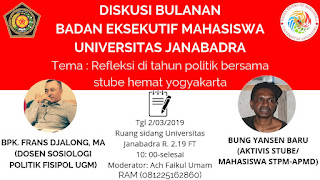 Ram Hara, a Janabadra student from Maybrat, West Papua who is also as the Social Minister of the student Executive Board of Janabadra University, said that this activity was a collaboration between the Ministry of Social Affairs of Janabadra University and the PAPEDA follow-up group.
Ram Hara, a Janabadra student from Maybrat, West Papua who is also as the Social Minister of the student Executive Board of Janabadra University, said that this activity was a collaboration between the Ministry of Social Affairs of Janabadra University and the PAPEDA follow-up group.
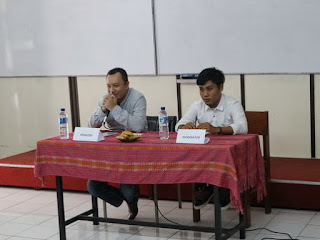 In his presentation, Frans Djalong reflected on the situation of the country's politics, starting from the beginning of Soekarno and other national figures in utilizing the Geopolitical situation and using it for Indonesian independence. The book entitled 'Di Bawah Bendera Revolusi' is one reference for students to read more about history. Furthermore, one of the points about political theory according to him is that there is no theory and practice, theory is the practice itself.
In his presentation, Frans Djalong reflected on the situation of the country's politics, starting from the beginning of Soekarno and other national figures in utilizing the Geopolitical situation and using it for Indonesian independence. The book entitled 'Di Bawah Bendera Revolusi' is one reference for students to read more about history. Furthermore, one of the points about political theory according to him is that there is no theory and practice, theory is the practice itself.I Hear, See and Do A Sharing about Church and Politics by Aru student community
Saturday, 2 March 2019by adminmarno
 The same thing happened in ‘Church and Politics’ training held by Stube-HEMAT Yogyakarta on February 15-17, 2019 with a theme 'Young, Millennials and PoliticalLiterate', in which the participants gained new enlightenment and understanding of church history and political dynamics, how young Christians should behave in the context of today's politics. They were encouraged not only to be listeners but also to share their experiences with others, either personal or group.
The same thing happened in ‘Church and Politics’ training held by Stube-HEMAT Yogyakarta on February 15-17, 2019 with a theme 'Young, Millennials and PoliticalLiterate', in which the participants gained new enlightenment and understanding of church history and political dynamics, how young Christians should behave in the context of today's politics. They were encouraged not only to be listeners but also to share their experiences with others, either personal or group.
 Trustha Rembaka, the coordinator of Stube-HEMAT Yogyakarta, who accompanied the group, reminded participants as citizens to take part in general election by giving vote in the election. He also helped participants to check whether their names were registered already as voters or not. At the end of the session, Tasya again revealed that young peopleshould reflect on the values of Christianity and support the government actively to bring socialwelfare. (Natasya Derman).
Trustha Rembaka, the coordinator of Stube-HEMAT Yogyakarta, who accompanied the group, reminded participants as citizens to take part in general election by giving vote in the election. He also helped participants to check whether their names were registered already as voters or not. At the end of the session, Tasya again revealed that young peopleshould reflect on the values of Christianity and support the government actively to bring socialwelfare. (Natasya Derman).
Be Smart to Fight Against Hoax The Imagination of Religion and Media in Politics (Attending a discussion at Duta Wacana Christian University 02/23/2019)
Monday, 25 February 2019by adminstube
 "The occuring problems are getting widespread and escalating immediately when it gets fuel of hoax issues. The various limitations and lack of knowledge of our society about using social media make us an easy target of the spread of hoax news on social media,” Valentine Wiji, the Head of Secretariat of the Anti-Defamation Society of Indonesia or MAFINDO. MAFINDO itself is a group of volunteers who are moved to collect data and information in various mass media or social media, or commonly called digital literacy. The focus of this group is to fight against dis-information and mis-information.
"The occuring problems are getting widespread and escalating immediately when it gets fuel of hoax issues. The various limitations and lack of knowledge of our society about using social media make us an easy target of the spread of hoax news on social media,” Valentine Wiji, the Head of Secretariat of the Anti-Defamation Society of Indonesia or MAFINDO. MAFINDO itself is a group of volunteers who are moved to collect data and information in various mass media or social media, or commonly called digital literacy. The focus of this group is to fight against dis-information and mis-information.
If the community is wise in using social media, it is expected to reduce victims of violence in the name of religion, ethnicity and races. Especially in current election year situation. Public is expected to be actively involved in fighting issue of hoaxes that are scattered on social media. Let us campaign ‘love reading’ so that we can be smarter and wiser in social media. (SAP)
Young, Millennial and Political Literate
Monday, 18 February 2019by adminmarno
Know and Do Action for Elections Student Exposure to General Election Commission of Yogyakarta Special Region
Tuesday, 29 January 2019by adminmarno
 At 1:00 PM Ahmad Shidqi, one of the commissioner members of KPU DIY, the division chairman of Socialization, Voter Education, Community Participation and HR opened the discussion and introduced two other members, namely Wawan Budiyanto, the division chairman of Planning, Data and Information; then Moch. Zaenuri Ikhsan, the division chairman of Organizational Technique division. He appreciated Stube-HEMAT Yogyakarta’s initiative to take part in welcoming General Election by organizing students to visit KPU DIY office to learn things related to the General Election. Trustha Rembaka, coordinator of Stube-HEMAT Yogyakarta introduced Stube's institution and its concern on students and youth by giving added value to them related to certain topics, and currently related to elections and political issues.
At 1:00 PM Ahmad Shidqi, one of the commissioner members of KPU DIY, the division chairman of Socialization, Voter Education, Community Participation and HR opened the discussion and introduced two other members, namely Wawan Budiyanto, the division chairman of Planning, Data and Information; then Moch. Zaenuri Ikhsan, the division chairman of Organizational Technique division. He appreciated Stube-HEMAT Yogyakarta’s initiative to take part in welcoming General Election by organizing students to visit KPU DIY office to learn things related to the General Election. Trustha Rembaka, coordinator of Stube-HEMAT Yogyakarta introduced Stube's institution and its concern on students and youth by giving added value to them related to certain topics, and currently related to elections and political issues.
Web Archive
2025 (15)Total: 483
Youtube Channel
Lebih baik diam dari pada Berbicara Tetapi tidak ada Yang Di pentingkan Dalam Bicaranya
-->






















